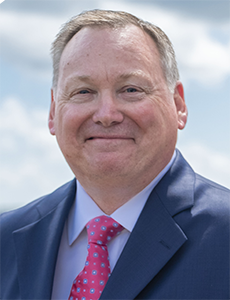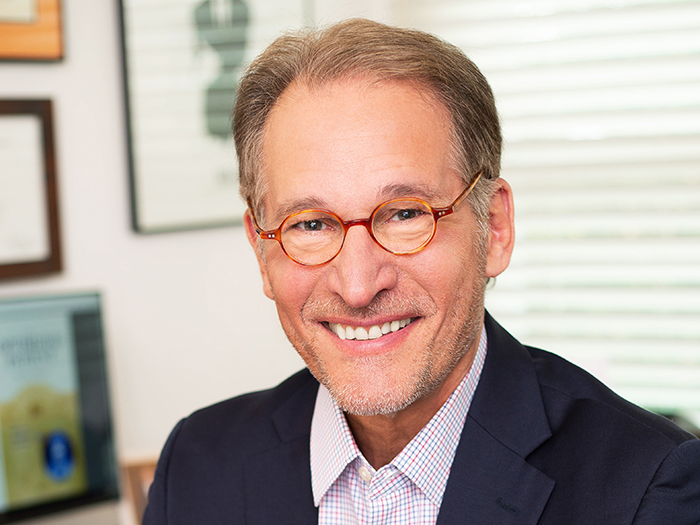15 Questions for the Falvey Insurance Group’s Mike Falvey

Recently, Risk & Insurance, got the chance to catch up with Mike Falvey, president and CEO of the Falvey Insurance Group. What follows is a transcript of that discussion, edited for length and clarity.
Risk & Insurance: If you don’t mind, why don’t we talk about business opportunities in the coming year? I see you do transportation logistics and you do some wholesale brokerage as well. You’ve got the marine cargo and stock throughput, but among those businesses, Mike, where are you seeing opportunities that are exciting?
Mike Falvey: Falvey sees opportunities across all product lines, but cargo is continuing to grow. We’re seeing really good growth there due to the hardening of the market. And, of course, we do stock throughput as well.
But the biggest growth we foresee is with transportation and logistics, and our all-risk shipper’s interest solution, which is an automated transactional shipping API, has really just been growing leaps and bounds.
R&I: Can you tell us why you are seeing that kind of growth, Mike?
MF: For a couple of reasons. With the increase of technology, we can capture data at a transactional level.
Before, a shipper’s interest was wrapped up into one policy, and you’d throw out a premium. At the end, you collected that premium, and you really wouldn’t know any detail. Now, we capture every time someone is shipping something and ensure they receive a bill of lading.
Think of Expedia. You go on and you book a flight from Boston to San Francisco. Up come four American Airlines flights, United, etc., and then you choose an option.
Our shipper’s interest solution is the same concept. We integrate directly into all types of shipping software to add a “Click to Add Insurance” button to any shipment.
With this approach, the insurance is already embedded, so we’re capturing all that data. The use of technology is big there. We’re providing not only the shipper’s interest but many complementary coverages that relate, so we are seeing strong overall growth as a result.
We’ve also introduced our own wholesale brokerage where we’re starting to see more opportunities. Falvey can either write a risk through our MGA programs, and what we may not have appetite for, we have enough contacts with our markets to see if they do. This provides a holistic solution for our clients. We are a one-stop shop.
Falvey also onboarded an inland marine team of six people with an established book of business. We’re excited for the opportunity in that market and to leverage their expertise in combination with our technology and distribution. We see big growth there as well.
R&I: One thing I couldn’t help but think about, Mike, are cargo theft rates. It just seems like they are a growing problem. How are you working with insureds in that area given how severe the increases in cargo theft are?
MF: Falvey has always prioritized loss prevention. We have a team on our staff that works directly with insureds on identifying proactive and preventative best practices and informs them of relevant current events like theft hot spots.
There are organized and sophisticated gangs currently committing cargo theft. We work to determine what they are doing, how they are doing it and what our insureds can do to protect their interests. We actively partner with our insureds, certainly on theft, as well as temperature control, because life science is a major specialization for Falvey.
R&I: I’m wondering, speaking of technology, what are you finding that’s working for you in terms of identifying theft hot spots or where gangs might be operating? How does that work technically? How do you find that out?
MF: One of our loss prevention professionals is in contact with a number of law enforcement entities. There are also some consulting partners that Falvey works with whose sole focus and specialization are incidents like this, so we’re sharing information back and forth and are able to inform our customers in close to real time.
R&I: You mentioned you’ve got an inland marine team coming on board. How is your business doing in terms of recruiting and retaining talent? Is it a big challenge or do you think you’ve got a pretty good handle on it?
MF: Talent is always a focus, and people are very important to us. We are proud to be faring well in light of the recent job market turbulence. In fact, our chief people officer was telling us the other day that, within our 10 most recent new hires, our first choice accepted in each instance, so we’re very happy about that.
Being specialized is important, and being in the industry that we are, we know who will be a good long-term fit. We are bringing on new people and bringing them into the insurance industry. And I’ll give a kudo to our director of marketing, Megan Bell, who just put out a great post on LinkedIn about how insurance seems boring, [but] insurance is exciting! And we’re excited to bring people into this career path.
R&I: We did mention the cargo theft issue. What are some of the other key risks that your clients are facing?
MF: In our industry, certainly in the cargo and transportation industries, supply chain disruption will always be a constant concern. We have specializations in high tech and life science so we always have our eye on CAT perils: wind, tornado. Tornadoes are a peril we really worry about.
Falvey does a lot of work in the life sciences, and a lot of pharma business is centralized in a couple of areas around the country; some in Tennessee, which experienced very damaging tornadoes recently.
And when a tornado comes through, the damage won’t be limited to one building; it could be three or four, so when you’re talking about the things that keep me up at night … it’s CAT perils and tornadoes, and theft. People don’t realize how bad it is, and it is becoming more and more of a problem.
R&I: Would you say that cargo theft gangs are getting more sophisticated?
MF: Definitely. These gangs have associates working inside the carriers and with the truckers. They are handing over full truckloads to these thieves.
The other factor is that more manufacturing has shifted to Mexico. The goods are coming from Mexico into the United States, and cartels interfere. Theft is much more sophisticated — but also more brazen.
R&I: You mentioned temperature control in the life sciences business, Mike, and I was thinking about that in relation to weather events and climate change. Has that become more problematic? Because you’ve got a very temperature-sensitive product in pharma, are you seeing (or are we seeing) more losses there due to storms delaying shipments?
MF: Yes, we are, and people don’t always think about something like the ice storm in Texas. The storm shut down power, which means no refrigeration, which means subsequent losses of pharmaceuticals.
We haven’t seen any losses out of California as of yet, but we’re bracing for that. When you observe these weather extremes, that is going to be more and more of an issue.
R&I: If we could talk about your career a little bit — you were in the Merchant Marines, and you actually were at sea, right, for quite a few years?
MF: That’s correct.
R&I: What motivated you to get into underwriting or into the insurance business?
MF: When I was at Kings Point, we did six months at sea our sophomore year, six months at sea our junior year, so I came back after being at sea for six months. It was July in Rhode Island, and I had to do a two-week internship, and they wanted me to go to the Coast Guard station in New York City.
My father at this point was working for FM Global, and he said, “We have openings in ocean marine insurance.” And I said “That’ll do” only so I could stay in Rhode Island for a couple of weeks in the summertime. I completed an internship and was offered a job at FM Global after graduation.
R&I: Your father was a fire chief, right?
MF: Yes, and when he retired, he became a FM Global/Allendale fire protection engineer. He didn’t propel my maritime career, but he did introduce me to insurance.
R&I: As you worked your way up, Mike, and formed your business and had these experiences in insurance, beyond your father’s substantial influence, were there other people that you now look at and go, “Wow, I’m so glad I met that person. They really made a difference in my life. They helped me move my career forward and helped me grow as a person”?
MF: Certainly the number one influence was Eddie Vanderson, who was at Lloyd Thompson. Eddie was a major mentor in helping me to get started, getting a cover letter for Falvey, and jump-starting industry relationships.
I’ve also got to give a big shout out to Andrew Brooks, who is retiring from Ascot. I think Andrew has done a phenomenal job with Ascot. They’ve consistently produced a profit and consistently kept all their people motivated. You don’t see a lot of turnover at Ascot.
David Howden is doing great with growth at Howden. And then Evan Greenberg at Chubb. Chubb is just a phenomenal company.
R&I: Is there anything about the business, Mike, that we didn’t ask you about that, as you were thinking about talking to us, you wanted to mention? It could be perspectives on the industry or work culture.
MF: I think you just said my magic word: culture. Talent and training and retention are all important, but I think the key is culture — developing it and prioritizing that culture versus strategy.
Always focus on culture over strategy. You can have a great strategy, but then the market can change and you’re out of luck. If you have the right people, and you have culture, the market can change but people are ready and willing to pivot and handle any challenge thrown their way.
Diversity and inclusion is also really important at Falvey, and ensuring we are a welcoming and accepting workplace. And Megan Bell, who I mentioned before, does a great job with key performance indicators. We survey our employees all the time [about] what we can be doing better.
R&I: When you think about culture and you use the phrase “the right people,” what traits in a prospective or current colleague are important to you?
MF: One is integrity. You have to have that, first and foremost, and then you need to have passion. You have to really want to be part of the bigger picture and able to collaborate, as opposed to showing up, ticking all the boxes and then leaving.
At Falvey, we really want you to buy in and to work with other people and try to be better, try to grow. Those are the type of people we’re looking for.
Data and innovation is another major initiative for Falvey. We have our own in-house software development team of 20+ and we’ve had that for years, since at least 2000.
We’re big on technology and we’re big on data, but where we are improving is bringing those two groups together as DevOps to make real, meaningful impact.
R&I: We didn’t touch on it specifically, but back to that temperature issue in life sciences products — are you using onboard sensors in that instance?
MF: Yes, for sure. The sensors are there and are tracking data. But there’s so much data and our underwriters can only absorb so much, and of course need to focus on underwriting.
We are instead presenting everything we can to them. All of the underwriters also have their own access to the data whenever they want. We utilize DOMO, a data visualization tool, that presents the information in a user-friendly, easy-to-digest manner.
All of our underwriters have the DOMO app on their phone, so the pertinent and time-sensitive information is always in their hands.
This all ties in with our inland marine team, and why we’re so excited about it is because we think we’re going to equip them with more tools.
When I ask our underwriters, “What’s holding you back? How come you can’t write more business?” I hear, “Well, it’s not that we don’t have the competition or we’re losing out. We just can’t get to it. We can’t get the quotes out.”
My response is, “Okay, so what if we take care of that for you?” They say, “Yeah, we could write more business.” &











